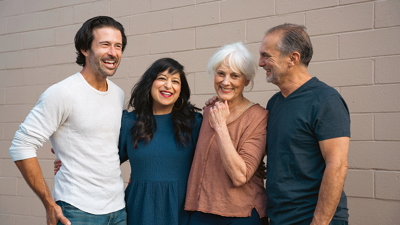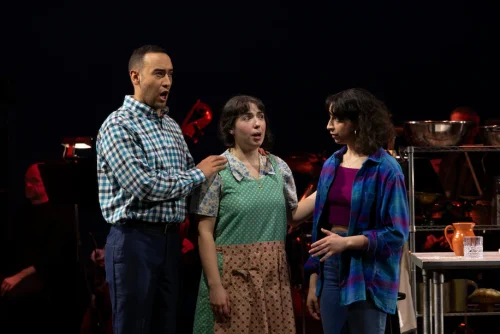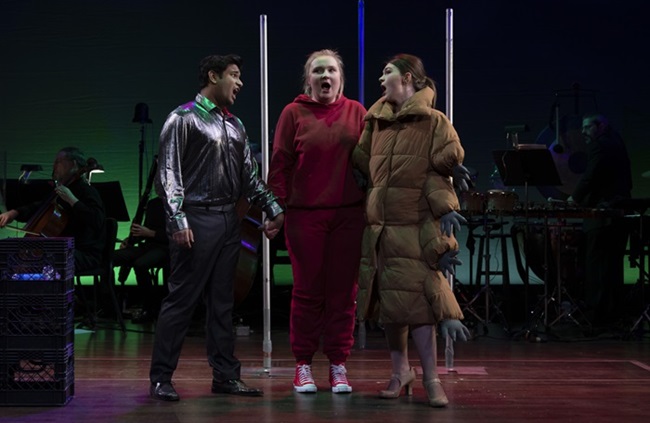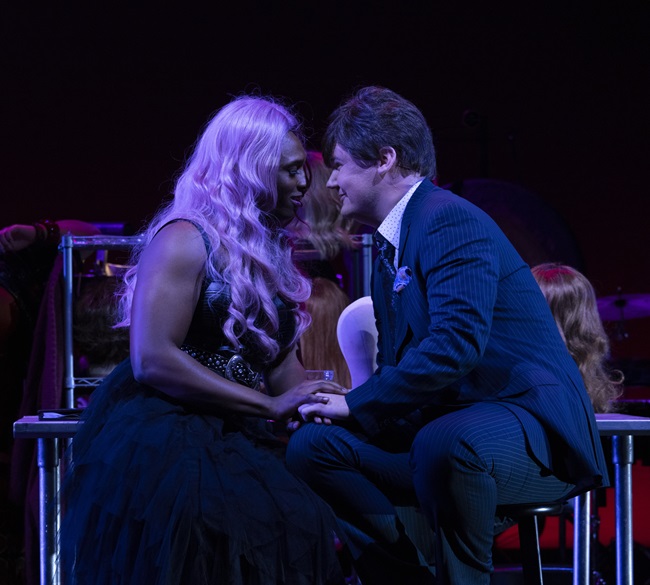Round House Theatre revives the devastating, Pulitzer-winning, card-trick psychodrama by Suzan-Lori Parks.
Review by Chris Klimek for the Washington Post June 4, 2024

There’s sibling rivalry, and then there’s the pitched fraternal battle between Lincoln and Booth, the fatefully named brothers at the center of Suzan-Lori Parks’s devastating card-trick psychodrama “Topdog/Underdog.” Had the playwright, who won the Pulitzer Prize for this deceptively rich two-hander, named her characters Cain and Abel, she’d still have captured the tragic inevitability of the thing. But she wouldn’t have the recurring chord of cruel, fundamentally American absurdity that has made this Black hybrid of “Waiting for Godot” and “True West,” first performed in the summer of 2001, one of the most rightly celebrated plays of this young, bloody, cruel and absurd century.
Parks had the peculiar genius to imagine a character that encapsulates the contradictions of our shaky republic: A Black man who performs in whiteface as his namesake, our 16th and most revered president. No, he’s not reciting the second inaugural or the Gettysburg Address; he’s letting wannabe John Wilkes Booths shoot him with blanks dozens of times each day at what’s described merely as “an arcade,” in one of Parks’s surreal flourishes.
“It’s easy work,” Lincoln insists to his little brother, if you can ignore the nesting-doll layers of humiliation baked into it — including the fact he fears losing even this dire gig to a wax dummy. Booth is not at all inclined to overlook those not-so-micro aggressions.
“Topdog/Underdog” isn’t set in any specified time or place, but its insular story of two deeply isolated brothers and roommates has uncannily predicted the air of menacing unreality that now surrounds our public discourse.
Director Jamil Jude’s confident Round House Theatre revival, anchored by nimble and entrancing performances from Ro Boddie and Yao Dogbe as Lincoln and Booth, respectively, harvests every note of humor and pathos from Parks’s immortal script. These brothers were abandoned by their parents at an impressionable age, each given an “inheritance” of $500. Their most prized possession is an album of photos from their distinctly un-idyllic childhood, which Booth, in particular, is given to reminiscing about. He even claims to want to emulate their negligent mom and pop, declaring his ambition to sire many offspring and then leave them to figure things out on their own.
Not that either of them have figured out very much. Booth wants Lincoln to return to his former calling as a cardsharp, taking the same slack-jawed rubes who now line up to shoot him for all the cash they’ve got at three-card monte. Booth even rehearses Lincoln’s fast dealing and faster patter (“Watch me now!”) when he’s home alone, and tries to get his brother to address him as “Three Card.”

Alas, his own sticky fingers are more adept at shoplifting than card-throwing. Despite his childish insistence that a woman named Grace is so gobsmacked by his pilfered prosperity that she’s both consented to unprotected sex and demanded that he marry her, Booth is utterly confounded by the perceived unfairness of the fairer sex. As for Lincoln, his wife left him years ago — then briefly sought solace in Booth’s bed!
They’ve had a rough time of it, these two brothers.
The despair they’re both working overtime to keep at bay is so omnipresent and oppressive that Jude, Boddie and Dogbe must mine every kernel of levity just to keep the enterprise from being too depressing to endure. One of these gags comes early, when Dogbe performs a sort of clown-car variation on a striptease, somehow producing an entire pilfered wardrobe from beneath his oversized parka — not just two complete suits, but two pairs of dress shoes. “I stole, and I stole generously,” he gloats. (The costume designer has dressed Dogbe’s Booth in an old Washington Bullets T-shirt, a welcome local touch.)

Throughout the long evening, the light of a neon sign — one we can’t quite read — suspended outside the window of Meghan Raham’s appropriately dingy set bathes the brothers’ barren home in a hellish crimson cast. The subtextual query beneath each stanza of Parks’s lacerating dialogue is, “Am I my brother’s keeper?” We already know the answer, but it hits with the force of a bullet all the same.
Topdog/Underdog, through June 23 at Round House Theatre. About 2½ hours, including an intermission. roundhousetheatre.org.







